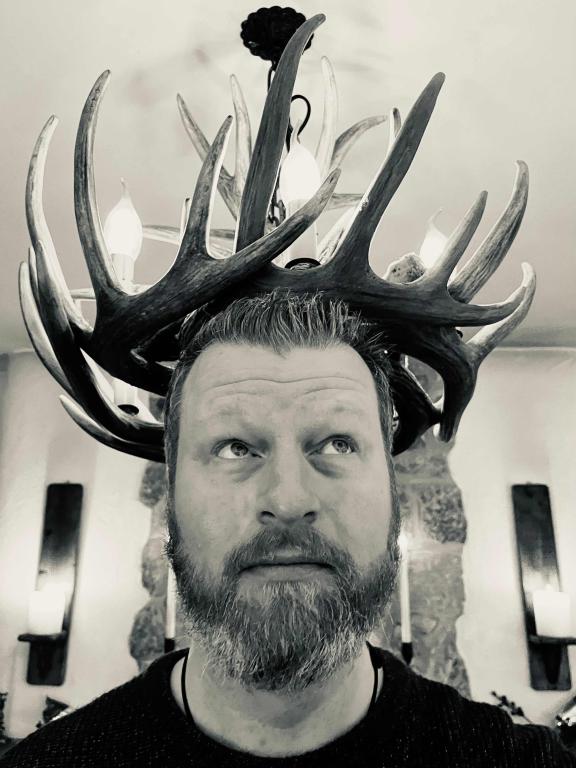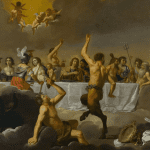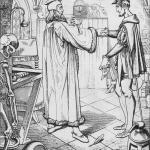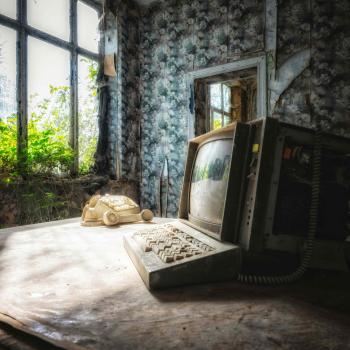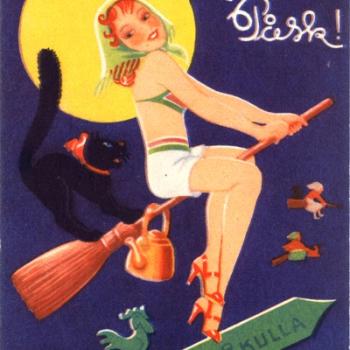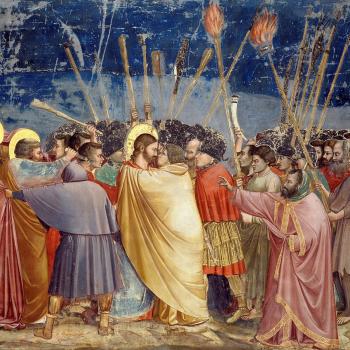I swear that I will always conceal and never reveal these secrets… (Society of Esoteric Endeavour 2009, 89) [1]
This solemn oath is delivered by the initiate into the secretive Society of the Horseman’s Word, taken from The Ancient Ritual of the Buchan Ploughmen, Incorporated with the Ancient Horsemen. A parallel society to the Freemasons, such initiatory oaths contain similar phraseology, and these binding words have, therefore, a magical context. Indeed, throughout the magical milieu, such oaths of secrecy serve to protect and maintain the efficacy and power of not only the individuals and spirits involved, but also the current itself. From Masonry, such has also entered the service of Ceremonial Magic, found in the esoteric Freemasonic orders, The Hermetic Order of the Golden Dawn, and the Ordo Templi Orientis. Indeed, the ritual elements of the solemn vows, such as the Horseman’s Oath, are sealed within certain prayers laced with the threat of what might befall those who go against their oath:
O Help me God to perform all my vows as a horseman and if I shall break any of them I wish no less a punishment to fall upon me than to be torn between two wild horses and my body quartered and thrown to the four winds of heaven and hell to be taken and buried into the sands of the sea where the tide ebbs and flows twice a day to show that I have been a deceiver of the faith. (Society of Esoteric Endeavour 2009, p. 91) [2]
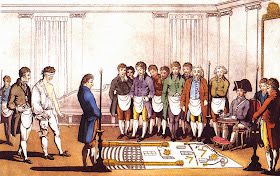
Comparable penalties are articulated within the rite of Freemasonry, describing the bounds placed upon the Entered Apprentice. Indeed, the oath of secrecy to protect the Mason’s Craft is found in one of its earliest documents, the Cooke Manuscript dated to around the mid-fifteenth century. In this context, an obsolete word is used: hele signifying to hide:
He shall hele the counsel or his fellows in lodge and in chamber, and wherever masons meet. [3]
From the Old English verb helan, meaning to conceal, or cover, hele derives from Middle English and is a now no longer used term cognate with the Scots heal, all of which indicate to mask, hide, or otherwise guard.
The Cooke Manuscripte continues:
He shall be no traitor to the art and and do it no harm nor conform to any enactments against the art not against the members thereof… [4]
These rather punitive sounding measures originate, of course, from a time when the skill of the Craft, be it that of the stonemason, or the guarded techniques of horsemanship, required careful guarding lest they be abused by greedy owners. Indeed, this early form of unionisation was forbidden and, therefore, rendered the act of secrecy all the more important and dangerous. One is minded of the Tolpuddle Martyrs who were six agricultural labourers convicted in 1834 of swearing unlawful oaths during a labour dispute. Whilst they were transported to the penal colonies of Australia, protests delivered them pardons and they were returned to England between 1837-39. This forms an early part of the history of unions and worker’s rights, but nevertheless underscores the requirement to maintain secrets from authorities for any skilled labourer.
Magically, these oaths take on a different meaning and purpose than simply protecting the members and their trade knowledge and skill. As etymological roots reveal, words in English for the act of solemn declaration works in accord with the powers that are invoked. Specifically, of oaths “sworn” and “to swear” all originate and are bound by the appeal to a numinous agent, be it deity, spirit, collective or other sacred power. Importantly, the utterer of oaths must hold a relationship to the power being evoked to bind the covenant, and the sealing of such forms a bond between those who take the oath and the spirits as witness and sealer of the oath. As a solemn declaration, swearing of oaths has long called upon supernatural or spiritual powers to oversee and enforce the sacred, earnest contract.
Today, the custom remains in which a sacred text is still used to witness and retain the pact of truth between the speaker and their sacred gods and lore-keepers; a tradition maintained in common courts of law, and even Freemasonry today where initiates can be sworn in using the Bible, Torah, Koran, and other holy books held sacred by the individual. Therefore, there is a tacit agreement that the individual making the oath is sincere and holds the sacred witness in high regard, with faith in the penalties that are uttered or implied. The basis of the oath rests, therefore, upon the character of the oath-taker — both their personal honour and how they comport themselves, and the inner relationship between them and their spirits and gods. In between, of course, are all those for whom the oath foreswears to protect and guard — to hele, conceal and never reveal. If one evokes a magical or spiritual authority in a pact, one assumes that they respect that authority and intend to fulfil the vow. Furthermore, breaking the oath ensures that faith between the guardian spirit and the individual is irrevocably sundered! In cases of witchcraft, this manifest palpably during the early modern period when suspected witches reported the requirement to renounce their baptism upon initiation, thus reneging on their oath to God and becoming a de facto oath-breaker, or warlock.

Within Wicca, oaths comparable to the Masonic standard are undertaken at initiation to the first degree:
…in the presence of the Mighty Ones, do of my own will and accord, most solemnly swear that I will ever keep secret and never reveal the secrets of the Art, except it be to a proper person, properly prepared, within a circle such as I am now in. All this I swear by my hopes of a future life, mindful that my measure has been taken, and may my weapons turn against me if I break this my solemn oath… [5]
The twentieth-century mystic, actress and founder of the Welsh Plant Brân family tradition, Ruth Wynn Owen held certain obligations for those attending under the banner of her house. One of these importantly did not require the taking of sacred and dreadful oaths, instead asking the subtle question: “Are you not trustworthy?” This simple statement turns the individual’s worthiness upon itself, requiring each to look into their own heart and, in so enquiring, become their own judge and arbiter. In this, the person’s integrity is recognised as a personal responsibility and that we must all answer to ourselves in regard to our measure of faithfulness.
The Old Irish gets or geis is a magical taboo, providing potential for blessing and curse, which sets its parameters via a spiritual boundary that confines the recipient. Should the bearer of the geis break with their duty, the penalty is automatic and swift, bringing death and dishonour. Such was the culture that maintained geasa as a formal, spiritual taboo, that the recipient was bound to observe certain obligations unless they were to suffer the terrible fate of dishonour, to be ridiculed in song and reputation. Death, of course, would be the ultimate penalty for the breaking of such an oath, but the suggestion remains that the dishonour would be carried on to all worlds and that the gods themselves would know of the crime. A geis could also signify the binding by fate, prophesying what must come, prohibiting certain other behaviours, and rewarding of blessing by the observation of these bonds.
Often, people swear to maintain or demonstrate a level of sincerity — perceiving such to be indicative of the highest level of honesty one may possess. Colloquially, people swear on the graves of loved ones, or else on their own life, suggesting some divine retribution in the after life as currency against their truthfulness. Of course, in the mundane, the weight of the promise is only measurable against the belief and nature of the individual. In the magical world, of course, we operate in the assumption that those around us hold similar ideas about the world and its operations. This can vary widely, but overall a belief in the spiritual in some capacity is a fundamental basis for most magical systems. It seems reasonable, then, to suppose that brethren in a magical compact would be sufficiently aware of such, and might respect the bonds of an oath between people, spirits and gods. Therefore, the magical oath has a power that might exceed that of the mundane world — higher even than the courts of law or religious institution — given that the magi and witch seeks to deal with spiritual forces in myriad ways and means.
- Society of Esoteric Endeavour. 2009. The Society of the Horseman’s Grip and Word, p. 89.
- Ibid, 91.
- “The Cooke Manuscript One of the Oldest Known Masonic Documents Written about 1450.” n.d. Accessed October 15, 2024. https://freemasonrymatters.co.uk/wp-content/uploads/2016/04/Cooke-Manuscript-1450.pdf.
- Ibid.
- https://sacred-texts.com/pag/gbos/gbos03.htm


